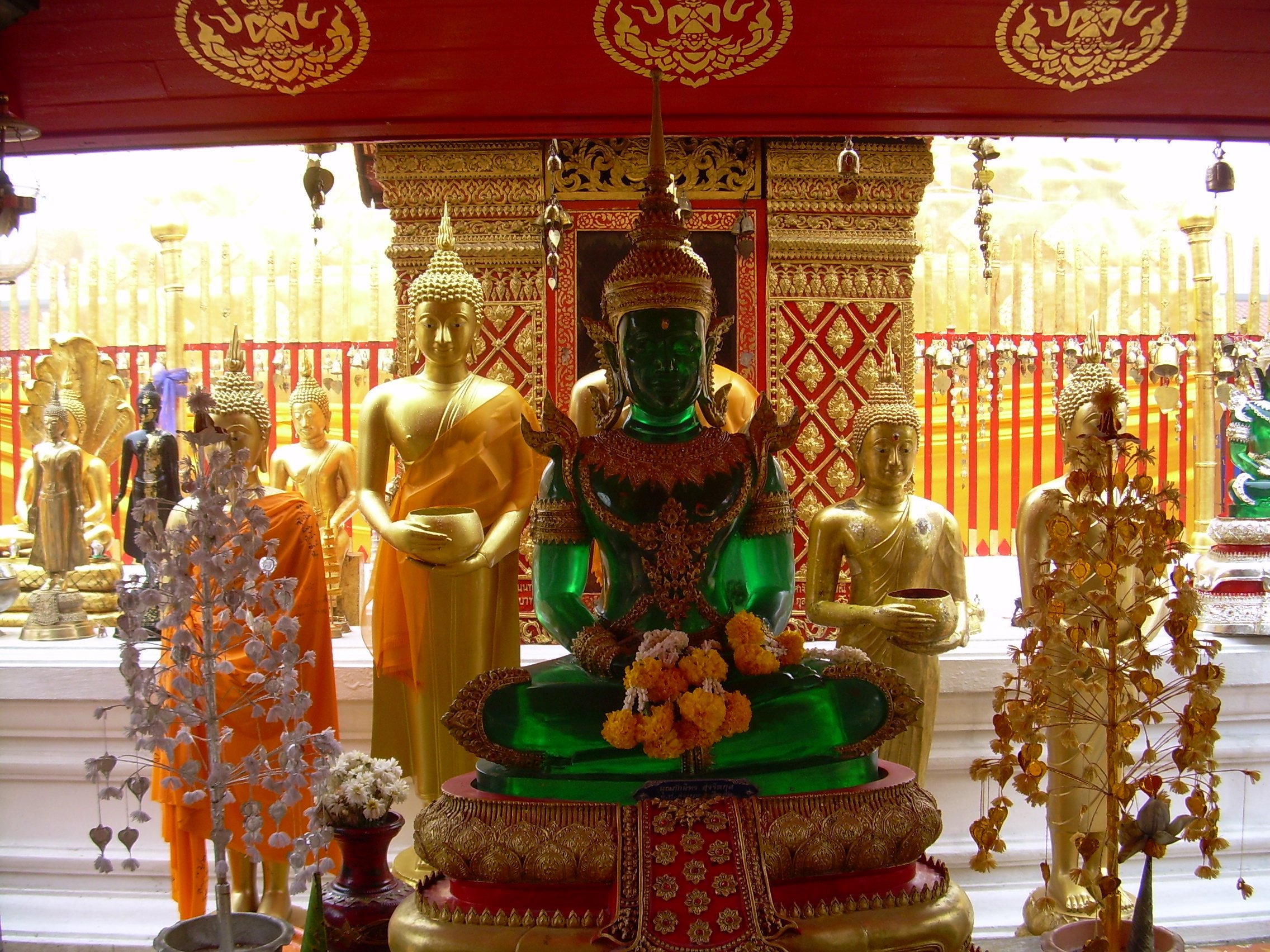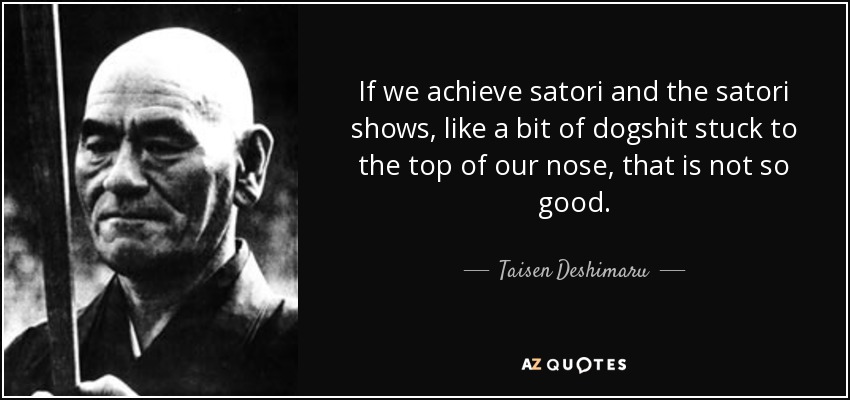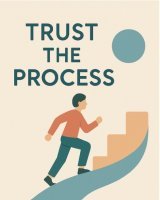Zen Enlightenment [Satori]
The Stink Of Zen

What is Zen Enlightenment [Satori]?
Zen Enlightenment means to be free of the effects of the mind, to be 100% present-moment-aware, and unencumbered with thoughts about the past or the future. This is sometimes referred to as a "Unity Consciousness".
The whole subject of enlightenment is much misunderstood. In my experience there is at least as much a lack of understanding about
this within Buddhist circles as there in the non-Buddhist and secular
world.
There is something in human nature - a desire to glamorise, sanctify, objectify and idolise – that elevates people who have offered deep insights to the human race and thus put distance between them and the rest of us.
But these great ones have exactly the same psychological, emotional, and physiological equipment as the rest of us. To put it bluntly – we all share the same basic equipment.
If you feel that you can't wait the ten thousand innumerable lifetimes that some buddhists seem to think are required to experience enlightenment then check out the "Big Mind" process created by Genpo Roshi which offers a facilitated and rapid access to the enlightenment experience.
Although enlightenment may seem like an unreachable goal, we’re actually having glimpses of enlightenment all the time.
If one can do it so can we all.
Stuck In Seeking

We get very hung up on the idea that enlightenment - or any form of expression of "spiritual progress" is ahead of us
- something to be attained - something to be aspired to - something
that we may experience one day in the next life or subsequent lives (for
those who subscribe to a belief in reincarnation).
We see it as always in the future - yet never the only place it can be - NOW!
Being stuck in seeking is the single biggest stumbling block to present moment awareness.
There is nothing of truth that we can find anywhere but NOW right here in this present moment.
The enlightenment state is just that - a state, an experience. It is not a state that can or should be maintained. An experience of unity consciousness is wonderful thing but of itself is little to no use to anyone this side of the grave other than the person experiencing it. To live and be fully functional in the dualistic world we live in we need to integrate these transcendent experiences to be of use and benefit to others. If you think of other transcendent experiences that we can enjoy in many other areas of life, they are wonderful and our lives are enhanced by them, but we can not live in those states all the time. We have to come back "down to earth" and engage in the world of duality as we experience it with the rest of the human race. Former American Zen Master Dennis Merzel aka Genpo Roshi (creator of the "Big Mind" process) expresses all this rather well:
Lost In Our Delusions About Enlightenment - "The Stink Of Zen"
If you can spare 10 minutes, read this extended interview with Genpo Roshi talking about integrating enlightenment experiences and the "Stink Of Zen" or see it on video.
States Become Stages Become Sages
The initial state of awakening is a state that may only last briefly – but once we have experienced it, we can’t unlearn it.
And with practise, dedication and discipline that state becomes a more frequent part of our experience until eventually we enter it as a stage – where we can stop thinking at will – and access transcendent states of awareness at will.
The only difference between highly developed spiritual people and the rest of us is one of degree.
They have acquired or developed or been blessed with (however you choose
to express it) the capacity to enter and maintain a present
moment awareness state whenever they want to or need to and can do so at
will for as long as they choose to or need to – and then to re-engage with
the everyday dualistic world.
The key to this is having the capability to move freely between these states at will and NOT to become stuck in enlightenment or duality.
What is Nirvana?
The late Thich Nhat Hanh gave us a lucid and profound explanation that defines nirvana as the cessation of all suffering, and our suffering comes from our wrong perceptions...
The Neurology of The Enlightened State
Dr Andrew Newberg is regarded as one of leading pioneers in the field of neuroscientific study of religious and spiritual experiences, increasingly referred to as – neurotheology.
His research work focuses on the nature of religious and spiritual practices and experiences and specifically how brain function is associated with various mental states, especially the relationship between brain function and mystical or religious experiences.
Neurologist Dr Andrew Newberg explains:
How to find your own path to enlightenment

Further Reading:
Beginners Mind [Shoshin] And The Voice Of Experience
5 Zen Mindsets For Mastery - In Any Area Of Your Life
Return to: How To Practise Mindfulness"
LATEST ARTICLES
Manifestation Without Magic: A Practical Model
 Manifestation without magic is not a softer or more intellectual version of popular manifestation culture. It is a different model altogether. Popular manifestation teachings tend to frame reality as…
Manifestation without magic is not a softer or more intellectual version of popular manifestation culture. It is a different model altogether. Popular manifestation teachings tend to frame reality as…Staying Committed When You Can't See Progress - The Psychology of Grit
 Uncertainty Is Not The Absence Of Progress, Only The Absence Of Reassurance. One of the most destabilising experiences in modern life is not failure, but uncertainty and staying committed when you can…
Uncertainty Is Not The Absence Of Progress, Only The Absence Of Reassurance. One of the most destabilising experiences in modern life is not failure, but uncertainty and staying committed when you can…The Battle For Your Mind - How To Win Inner Freedom In A Digital Age Of Distraction
 From External Events to Inner Events. We often think of “events” as things that happen out there: the traffic jam, the rude comment, the delayed email reply. But what truly shapes our experience is wh…
From External Events to Inner Events. We often think of “events” as things that happen out there: the traffic jam, the rude comment, the delayed email reply. But what truly shapes our experience is wh…How to See Your Thoughts Without Becoming the Story
 A Practical Guide to Thought-Awareness. You can spend your life inside the stories of your mind without ever learning how to see your thoughts clearly and objectively. Most of the stuff we tell oursel…
A Practical Guide to Thought-Awareness. You can spend your life inside the stories of your mind without ever learning how to see your thoughts clearly and objectively. Most of the stuff we tell oursel…The Collison Decision Matrix - A Simple Framework for Better Choices
 The Collison Decision Matrix Is A Practical Everyday Thinking Tool. Most of us spend a surprising amount of time worrying about decisions. From small ones such as what to wear, what to eat, what to te…
The Collison Decision Matrix Is A Practical Everyday Thinking Tool. Most of us spend a surprising amount of time worrying about decisions. From small ones such as what to wear, what to eat, what to te…The Power Of Asking The Right Question
 The Power Of Asking The Right Question Lies In The Quest For Insight. To experience the power of asking the right question you must develop the practice of asking questions. The best way to improve th…
The Power Of Asking The Right Question Lies In The Quest For Insight. To experience the power of asking the right question you must develop the practice of asking questions. The best way to improve th…Site Pathways
 Here is a site pathway to help new readers of Zen-Tools navigate the material on this site. Each pathway is based around one of the many key themes covered on this site and contain a 150 word introduc…
Here is a site pathway to help new readers of Zen-Tools navigate the material on this site. Each pathway is based around one of the many key themes covered on this site and contain a 150 word introduc…How To Live With Contradiction - Beyond Thought Let Stillness Speak
 A major impact on so many peoples' lives is the situational contradiction of unfilled realistic expectations. So where does all this leave us? Well here we are, with mental equipment that is more lim…
A major impact on so many peoples' lives is the situational contradiction of unfilled realistic expectations. So where does all this leave us? Well here we are, with mental equipment that is more lim…How To Trust The Process Of Mindfulness - Right Now
 In mindfulness, the process isn’t some distant goal — it's what is happening right now. When we talk about how to trust the process of mindfulness the credibility of the process is heavily dependent…
In mindfulness, the process isn’t some distant goal — it's what is happening right now. When we talk about how to trust the process of mindfulness the credibility of the process is heavily dependent…Inner Mastery For Outer Impact - Mental Clarity For Effective Action
 Insights only matter if they translate into consistent action. In a world crowded with quick fixes and motivational soundbites, the theme “Inner Mastery for Outer Impact” calls us to something more e…
Insights only matter if they translate into consistent action. In a world crowded with quick fixes and motivational soundbites, the theme “Inner Mastery for Outer Impact” calls us to something more e…The Wise Advocate - Helping You Achieve The Very Best Outcome
 The focus of your attention in critical moments of choice either builds or restricts your capacity for achieving the best outcome. When we talk of 'The Wise Advocate' its easy to think of the consigl…
The focus of your attention in critical moments of choice either builds or restricts your capacity for achieving the best outcome. When we talk of 'The Wise Advocate' its easy to think of the consigl…Trust The Process - Beyond The Cliche
 The phrase "trust the process" has become a cliche, the woo-woo mantra of the "self help" industry. Those three little words feel like they ought to mean something useful but hidden behind them are a…
The phrase "trust the process" has become a cliche, the woo-woo mantra of the "self help" industry. Those three little words feel like they ought to mean something useful but hidden behind them are a…